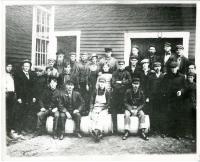Industry develops quickest where raw materials meet easy transportation and ready energy, both human and otherwise. In Hallowell, a point jutting into the Kennebec River known as Bombahook was a convenient location. The peninsula, known later as Sheppard's Point, became the home for sawmills, grist mills and shipyards. A foundry and iron works soon followed, as did a woodworking mill and a linseed oil factory.

Sheppard's Point
Hubbard Free Library
Sheppard's Point was the location of many important Hallowell manufacturing operations. The Milliken sawmill is on the left. The Fuller Foundry and Knickerbocker's Ice House are on the right. Captured logs and buildings on rafts belong to the Hallowell Steam and Boom Company.
The Hallowell Cotton Mill can be seen in the background. Maine's domeless State House in Augusta can be seen center right in the distance just above the boom islands in the Kennebec.

Fuller Foundry
Hubbard Free Library
Each of the businesses that developed met a local need. The iron works produced iron parts and fittings for farmers as well as shipwrights and cast the first steam engine used in the Cotton Mill factory. The woodworking shop milled lumber and produced cut lumber and moldings for carpenters and cabinetmakers, and also produced wood-block patterns for the oil-cloth factories. Later it produced wooden lasts for the shoe factories.

Boston Flint Company sandpaper mill beside Vaughan Brook.
Courtesy of Sumner A. Webber, Sr., an individual partner
Vaughan Brook tumbled into the Kennebec on the north side of Sheppard's Point. The stream provided power for several mills including a sandpaper factory and wire mill that harnessed the power of water and gravity so critical to America's development. A walk along the stream bank reveals pieces of chalk and flint to this day imported from Dover, England to try to make a go of the sandpaper business.

Boston Flint Co. sandpaper mill, Hallowell, ca. 1910
Hubbard Free Library
In the pre-automobile era no services were in more demand than those of blacksmith, wheelwright and carpenter. A carriage-making concern was a mainstay of the local economy for all of the 19th century. When the granite industry moved into full production carpenters and wheelwrights produced the gallamanders that were necessary to move heavy loads of granite. Blacksmiths were are the heart of the granite industry where sharp chisels were an absolute necessity.

Wire Mill on Vaughan Brook.
Hubbard Free Library
